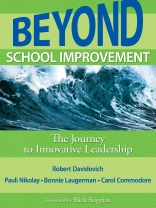‘The authors are grounded educational leaders who have lived the approach to improvement and innovation that they write about. Filled with anecdotal examples, reflection exercises, and practical strategies, this is a very useful and timely resource for educators seeking to understand and influence educational innovation and transformation in the 21st century.’
—Michael H. Dickmann, Professor
Cardinal Stritch University
‘This book stimulates leaders as they stretch their organization′s culture to reveal mental models, consider external trends, and seek creative and energizing strategies that will prepare students for a future we cannot yet define.’
—Edie Holcomb, Consultant
Marzano Research Laboratory
Prepare students to succeed in a changing world!
Because the world is constantly evolving, school improvement alone is not enough to prepare students for success in the 21st century. Educators also need to be innovators who nurture a culture of both improvement and innovation.
Based on complexity theory, systems thinking, innovation theory, and years of practical expertise, Beyond School Improvement prepares school leaders to connect with the new science on change and provides skills, practices, and tools for creating and leading dynamic educational systems. The authors discuss four elements of change—dissonance, identity, information, and order—and define five essential practices for leaders:
- Holding courageous conversations
- Embracing dissonance
- Creating context
- Changing your field of vision
- Letting ideas collide
Self-assessment activities, team conversation starters, stories, and examples support leaders as they balance improvement and innovation within themselves, their classrooms, and their organizations.
Cuprins
Foreword by Rick Stiggins
Preface
Acknowledgments
About the Authors
Part I. Leading Beyond Improvement
1. Schools in a Changing World
In This Chapter
The Need for Improvement
Are Our Schools Broken?
Trends in the External Environment
Two Trends: Getting Better and Becoming Different
Summary
Team Conversation Starters
Self-Assessment: Schools in a Changing World
2. Improvement Is Not Enough
In This Chapter
Awakening to the Difference Between Improvement and Innovation
Improvement Is Not Enough
Lorie′s Story
Schools Working Toward Innovation
Vignette 1: Michelle′s Story
Vignette 2: A Midwestern School District
Vignette 3: The Story of SBK High School
Summary
Team Conversation Starters
Self-Assessment: Improvement is not Enough
3. Attributes of Innovation
In This Chapter
Starting the Journey to Improvement and Innovation
Randy’s Story: Looking Beyond Current Practice
Key Attributes for Innovation
Unwelcome in Command and Control
Envisioning Leading Adaptive Systems
Self-Organizing Systems
Starting the Journey
Summary
Team Conversation Starters
Self-Assessment: Attributes of Innovation
4. Develop the Courage to Leap
In This Chapter
Innovation Life Cycles
The Hero’s Journey
Developing the Courage to Innovate
Summary
Team Conversation Starters
Self-Assessment: Develop the Courage to Leap
5. Hold Courageous Conversations
In This Chapter
Personal Orientation to Change
Sue′s Story
John′s Story
The Power of Paradoxes
Summary
Team Conversation Starters
Self-Assessment: Hold Courageous Conversations
Part II. Essential Leadership Practices
6. Embrace Dissonance
In This Chapter
Dissonance in the Natural World
Essential Leadership Practice – Embrace Dissonance
What Embracing Dissonance Looks Like in Practice
Action Tips – Embrace Dissonance
Paradoxical Leaders
Summary
Team Conversation Starters
Self-Assessment: Embrace Dissonance
7. Create Context
In This Chapter
The Importance of Identity
Essential Leadership Practice – Create Context
What Creating Context Looks Like in Practice
Action Tips – Create Context
Paradoxical Leaders
Summary
Team Conversation Starters
Self-Assessment: Create Context
8. Change Your Field of Perception
In This Chapter
The Importance of Information
Essential Leadership Practice – Change Your Field of Perception
What Changing Your Field of Perception Looks Like in Practice
Action Tips – Change Your Field of Perception
Paradoxical Leaders
Summary
Team Conversation Starters
Self-Assessment: Change Your Field of Perception
9. Let Ideas Collide
In This Chapter
The Importance of Order
Essential Leadership Practice – Let Ideas Collide
What Letting Ideas Collide Looks Like in Practice
Action Tips – Let Ideas Collide
Paradoxical Leaders
Summary
Team Conversation Starters
Self-Assessment: Let Ideas Collide
10. Innovate the Way You Lead
In This Chapter
The Journey Starts With Unlearning
The Inner Journey
Action Plan for Innovating the Way You Lead
Summary
Resource A: Glossary
Resource B: Essential Leadership Actions
Resource C: Continuum of Leadership Behavior
References
Index
Despre autor
Carol Commodore is an independent consultant whose special interests center on leadership, assessment, systems thinking, motivation and learning. An educator for more than 30 years, she served as a classroom teacher, a department chair, an assistant superintendent and an assessment coordinator. During her tenure as a district leader she facilitated the establishment of new programs in the areas of balanced assessment and foreign language. Carol has coauthored three other books in the areas of assessment and leadership. Carol presents and consults for local, state, national and international organizations across North America, Asia, and the Middle East.












